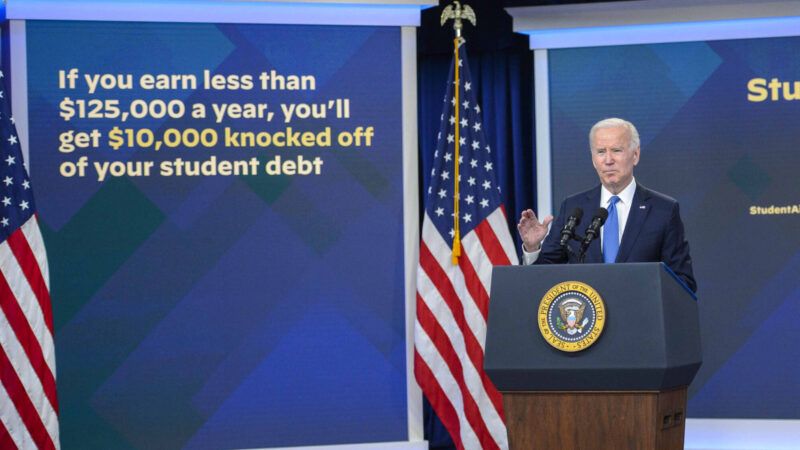Biden's Student Loan Pause Overwhelmingly Benefited Wealthier Americans
Is this what equity looks like?

It's been more than three years since federal student loan borrowers had to make regular monthly payments or face accumulating interest—and it's now more clear than ever that the student loan payment "pause" overwhelmingly benefited more affluent Americans.
Student loan payments and interest were temporarily put on hold by former President Donald Trump in March 2020, and that pause has been extended six times during the past three years. In November, President Joe Biden extended the pause until June 30 of this year—giving the Supreme Court time to review his proposal to forgive up to $20,000 in student debt for federal borrowers.
From the start, it seemed fairly obvious that student debt relief would generally benefit wealthier Americans since individuals from middle- and upper-income households are more likely to take out loans in pursuit of college and graduate degrees. The past three years have demonstrated just how inequitable the student loan pause has been, as a new report from the Brookings Institution makes clear.
"The payment pause especially benefits high-income households because they tend to have larger student loan balances—and therefore higher payments," writes Sarah Turner, a professor of economics and education at the University of Virginia and the author of the Brookings report. "Without the pause, households in the top 40% of the income distribution (corresponding to family incomes above about $80,000) would account for about 60% of student loan payments but only 41% of borrower households. By contrast, households in the bottom 20% (corresponding to incomes below about $30,500) account for about 13% of borrower households but only 5% of payments."
Turner points out that the student loan pause is "appreciably less progressive" than Biden's proposed student loan relief plan—even though that, too, would overwhelmingly benefit affluent Americans—because it applies to all federal loans. She also warns that many low-income borrowers might struggle to make payments when the pause ends, as their economic circumstances might have changed considerably in the three-plus years since they were last expected to make a student loan payment.
"Overconfident promises from the Biden administration about the likelihood of loan forgiveness have likely made existing relief programs less salient to borrowers," Turner writes. As such, many borrowers may not be prepared for the bills that could be coming this summer if the Supreme Court strikes down Biden's student debt forgiveness plan. "Failing to prepare at-risk borrowers for these outcomes is irresponsible and may inflict more harm on those who have already spent years struggling with burdensome student debt," warns Turner.
Indeed, the final result of Biden's refusal to restart federal student loan payments (and his politically charged promises to forgive a significant amount of that debt) may be to crush the very low-income borrowers that the president has talked so much about helping. Is this what equity looks like?
There's no doubt that the White House would try to pass the buck if that comes to pass—when Biden extended the student loan pause in November, he said he was only doing it because "Republican special interests and elected officials" had sued to block his debt relief plan. But no one forced Biden to overpromise student debt relief and then overreach his executive powers in an attempt to deliver it. In fact, no one forced him to keep extending the student loan pause again and again, either, even long after the pandemic's economic effects have subsided.
Biden's extensions of Trump's student loan pause serve as another example of how well-intentioned policies can spiral out of control without a clear exit strategy. Some student loan borrowers may have needed temporary assistance during the height of the pandemic, but transforming that temporary solution into a lengthy pause on student loan payments has mostly benefited those who didn't need the help in the first place.

Show Comments (56)